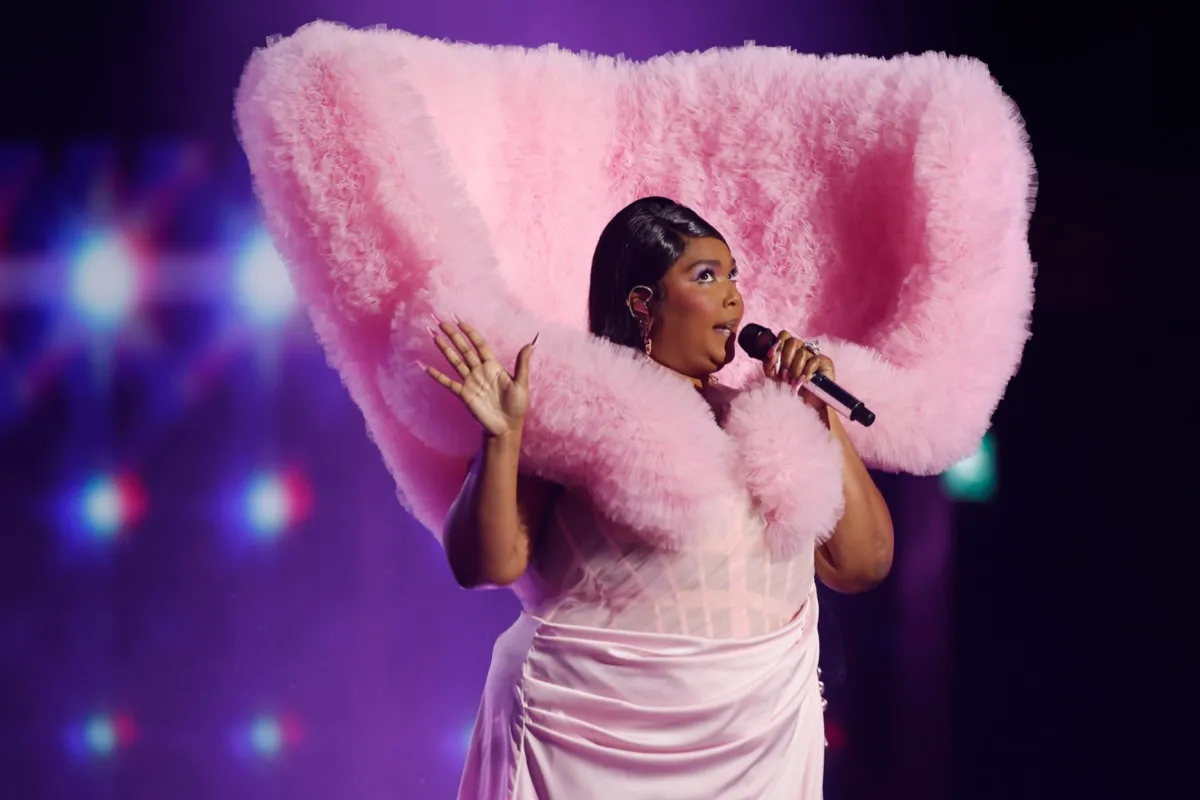My ambivalence meter is going crazy right now, and so is Lizzo’s, apparently. It’s all over the fashion- and pop culture-obsessed internet that Victoria’s Secret & Co. is attempting to make itself culturally relevant again by rebranding itself as slightly less evil. The new Victoria’s Secret is offering larger sizes and is bringing back the famous annual Victoria’s Secret Fashion Show, but this time it will include some larger-size bodies in addition to the usual Heidi Klums and Kendall Jenners we have historically seen in the long-running lingerie showcase.
On Sunday, the “About Damn Time” singer and Yitty creator retweeted a video of a recent Victoria’s Secret ad campaign which seemed to be broadcasting the company’s new body inclusivity goals by mixing in a few quick frames of slightly larger-than-traditional-model-size bodies (nothing really groundbreaking) along with, by my count, more BIWOC than in years past, and adding her commentary. “This is a win for inclusivity for inclusivity’s sake,” Lizzo tweeted, speaking about the inclusion of more “plus-size” models. “But if brands start doing this only because they’ve received backlash then what happens when the ‘trends’ change again? Do the CEOs of these companies value true inclusivity? Or do they just value money?”
Lizzo, who uses her stardom to stand up for plus-size body positivity, and is the creator of Yitty—the underwear and shapewear brand with a wide enough array of sizing that it can be called truly inclusive—is in a good position to talk about how sizeism, misogyny, and colorism could affect one’s bottom line and if marketing around it might be in earnest or just lip service.
The fall and rise of the Victoria’s Secret fashion show
Here’s what you need to know about Victoria’s Secret’s crazy controversy in the last five years and its recent rebranding: The announcement of the return of the famous fashion show came from the company’s Chief Financial Officer during a 2022 earnings call last Friday. Based on the delivery method, yeah, I think they probably do “just value money.” So, they’re bringing the iconic annual fashion show, which began in 1995, back after a four-year break. What happened four years ago? Oooh, girl.
After more than 20 years, the show was canceled in 2019, soon after Ed Razek, the Chief Marketing Officer of Victoria’s Secret’s parent company, L Brands, made transphobic and fatphobic comments during an interview with Vogue. Razek said the brand had “considered putting a transgender model in the show or looked at putting a plus-size model in the show,” but that the reason for doing so might be to “shut up some reporter.” He also said the show would not showcase “transsexuals” because “the show is a fantasy.”
Around the same time as this dumpster fire interview, another L Brands executive was linked to Jeffrey Epstein, according to reporting from Business Insider, which—we probably don’t need to tell you—was a very bad look. In 2020, the New York Times published an exposé on the toxic company culture at the lingerie brand, with former employees and models accusing Razek of harassment and misogyny.
That’s not all: The 2020 Hulu documentary, Victoria’s Secret: Angels and Demons, highlighted all manner of evil in the company’s history, alleging body shaming, misogyny, and even sexualization of minors by the company’s higher-ups.
It doesn’t seem like Victoria’s Secret had much of a choice in its move to drop the sizeist associations of the past and launch an attempt at a rebranding effort. “Our new brand projection and mission will continue to be our guiding principle,” reads a statement shared by the company with People Magazine. “This will lead us into new spaces like reclaiming one of our best marketing and entertainment properties to date and turning it on its head to reflect who we are today. We’re excited to share more later this year.”
I don’t know about you, but terms like “brand projection” and “best marketing property” sound more like a message to stockholders than a human rights manifesto to me. Lizzo has more reason to be concerned about the earnestness and staying power of this inclusivity rebranding, since the larger sizes the company is proudly touting (cup sizes up to G, band sizes up to 44, and underwear and lingerie up to XXL) are only available online, and not in brick-and-mortar retail stores, which is extremely bogus. Even Khloe Kardashian makes sure her larger sizes are available on the rack for her Good American clothing line, and she’s not necessarily known as a major progressive activist.
As Lizzo implied, being accepting of different body sizes shouldn’t be company policy only when it’s on-trend, so we’re going to be keeping an eye on this one.
(featured image: John Phillips, Getty Images)









Published: Mar 6, 2023 07:14 pm